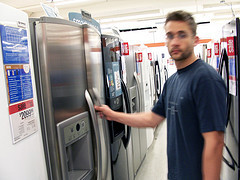“The Internet Of Things” Means Your Smart Refrigerator Could Launch Cyber Attacks
Before you start accusing your fridge of plotting your demise, it’s not like these appliances will come to life and tie you up. But a cyber attack, well, that’s a possibility, notes Quartz.
A new study released by a security company called Proofpoint says that between Dec. 23 and Jan. 6, more than 100,000 Internet-connect smart things — media players, TVs and at least one fridge — were part of a computer network that sent 750,000 spam emails.
If this is true, it’d be the first time anyone has proved that these kinds of devices are being bent to the will zombie networks to slam people with spam, mine bitcoin and other dastardly deeds.
And it’ll probably just get worse, now that hackers appear to be employing anything and everything that uses the Internet in their attacks.
From Proofpoint’s statement on the study:
“Internet-enabled devices represent an enormous threat because they are easy to penetrate, consumers have little incentive to make them more secure, the rapidly growing number of devices can send malicious content almost undetected, few vendors are taking steps to protect against this threat, and the existing security model simply won’t work to solve the problem.”
So should you start worrying that your refrigerator is watching you and silently plotting? Maybe not quite yet. Spam can be effectively filtered in email accounts, and there’s no evidence that bigger hacks using smart appliances and other devices are in the immediate future. But there will likely come a day when manufacturers start to seriously considering beefing up the security of those devices or face a battle in the kitchen/living room/anywhere the Internet is employed.
Previously in invasive smart things: FTC: Webcam Company’s Lax Security Led To Invasions Of Privacy
Someone’s refrigerator just took part in a malicious cyberattack [Quartz]
Want more consumer news? Visit our parent organization, Consumer Reports, for the latest on scams, recalls, and other consumer issues.


